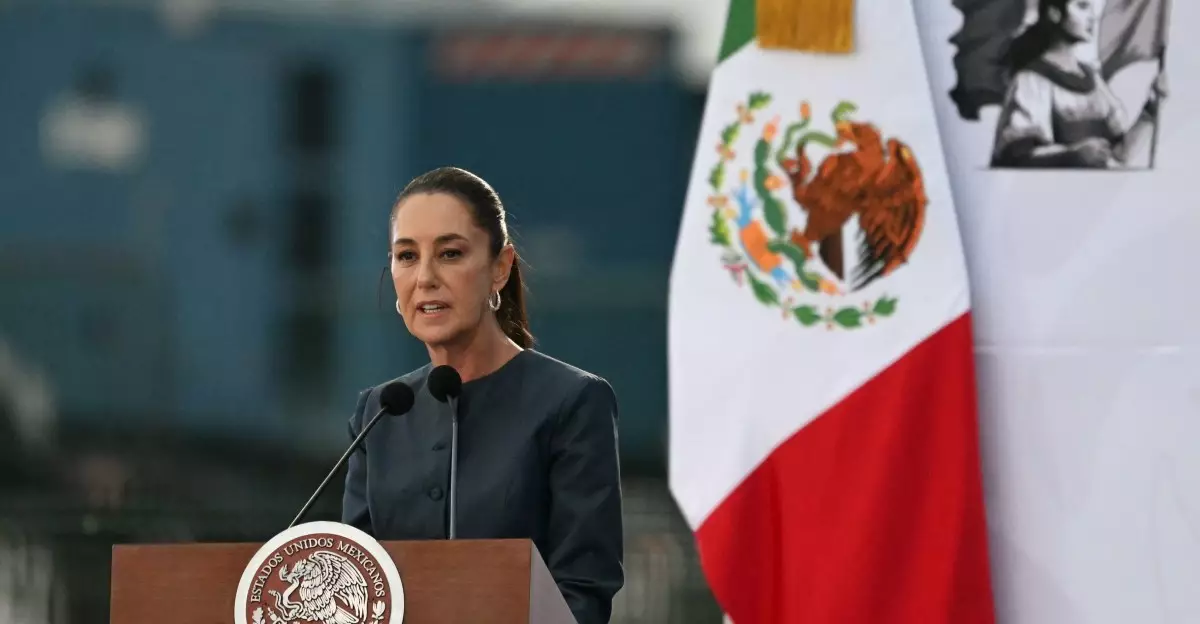In a striking move that shines a light on territorial sentiments and international relations, Mexican President Claudia Sheinbaum has taken a bold stand against a decision made in the highest echelons of U.S. politics. The issue at hand involves the rebranding of the Gulf of Mexico as the “Gulf of America” on Google Maps, a change initiated under former President Donald Trump. This naming dispute is far more than mere semantics; it encapsulates deeper issues of sovereignty, identity, and the complexities of international relationships in the age of tech.
The Legal Actions Unfold
In an aggressive response to what Sheinbaum deems an overreach by the U.S. government, Mexico has initiated legal proceedings against Google. The lawsuit comes as a culmination of her repeated assertions that international geography cannot be dictated by a singular nation’s whims. The Mexican government has been articulate in its stance: according to global law and geographic norms, the Gulf cannot be merely renamed by one country, given its significance to multiple nations, including Mexico and Cuba. Sheinbaum’s perspective is refreshingly assertive; she underscores that the U.S. can name what exists within its territorial borders but has no sovereign authority to alter the identity of the shared Gulf waters.
Historical Context and Political Tensions
The dispute over the Gulf’s name isn’t an isolated incident but a reflection of the historical tensions that exist between Mexico and the United States. From trade disagreements to immigration policies, the border dynamics have often caused friction. This incident serves as a reminder that even in the digital age, where technology firms like Google can impact perceptions and understanding, national pride and territorial claims still hold tremendous weight. Sheinbaum’s lawsuit draws a line in the sand, positioning her as a staunch defender of Mexican identity in a world where corporate decisions can erase cultural narratives.
Impact on Tech Giants and Global Standards
The reaction from Silicon Valley has been anything but predictable. Following Trump’s directive, Google was one of the first tech firms to implement the name change, reflecting the immense power tech companies wield in shaping everyday realities. Apple’s subsequent compliance demonstrates the industry’s inclination to follow suit under governmental pressure. However, it raises significant ethical questions. Should multinational corporations dictate how geographic locations are marketed, especially in ways that may provoke diplomatic strife? The fact that MapQuest has refused to make adjustments, opting instead for humor towards the name change, illustrates the divided opinions on such matters within the tech industry.
An Ongoing Legal Battle
The legal actions taken by Mexico are much more than about the name of a body of water; they symbolize a larger fight for respect and acknowledgment in the global arena. It signals to other nations that they too have rights and voices that demand to be heard, especially in matters of identity. The lawsuit presents an opportunity for discourse about the cultural implications of geographic designations and whether they should be subjected to political whims. With U.S. congressional actions potential furthering the contentious narrative surrounding the name change, it appears the battle lines are drawn.
Public Sentiment and International Reactions
While reactions within Mexico may lean towards staunch support of Sheinbaum’s initiative, the responses across borders may vary. Citizens familiar with historical subtexts may view the renaming as not only a dilution of geographical integrity but also an affront to national pride. Meanwhile, many in the U.S. may perceive it as an overreaction or an unnecessary legal conflict instigated by a foreign nation. The international community watches closely; the outcome of this case could set precedents affecting how national identities are preserved in an increasingly interconnected world, where information—and misinformation—spreads faster than ever.
In this multifaced saga of a name, we find ourselves challenging not only geographical nomenclature but broader discussions about national identity, power dynamics, and the role of technology in our lives. The Gulf of Mexico and its new proposed title encapsulate more than just a shift of letters on a map; they underline the evolving complexities of our global narrative.

